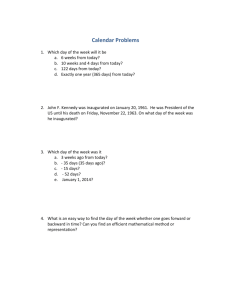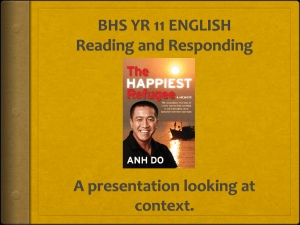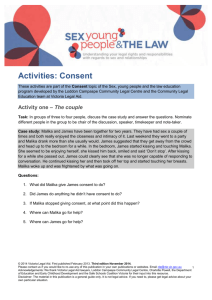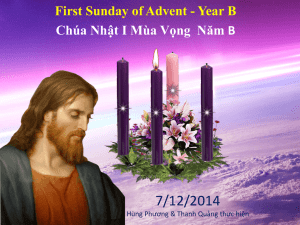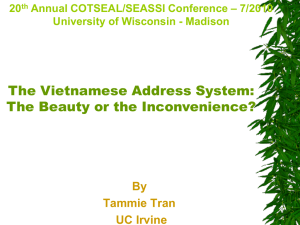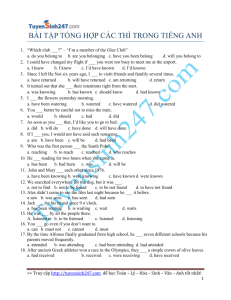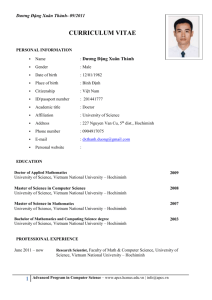HAPPIEST REFUGEE COURSEWORK 2013
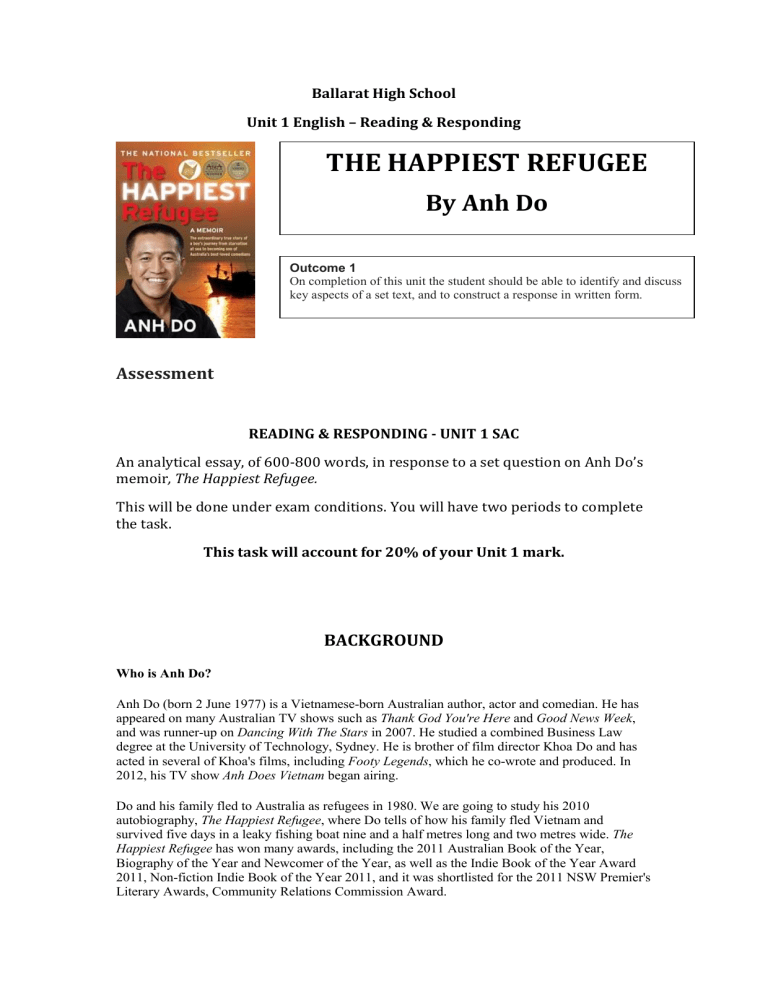
Ballarat High School
Unit 1 English – Reading & Responding
THE HAPPIEST REFUGEE
By Anh Do
Outcome 1
On completion of this unit the student should be able to identify and discuss key aspects of a set text, and to construct a response in written form.
Assessment
READING & RESPONDING - UNIT 1 SAC
An analytical essay, of 600-800 words, in response to a set question on Anh Do’s memoir, The Happiest Refugee.
This will be done under exam conditions. You will have two periods to complete the task.
This task will account for 20% of your Unit 1 mark.
BACKGROUND
Who is Anh Do?
Anh Do (born 2 June 1977) is a Vietnamese-born Australian author, actor and comedian. He has appeared on many Australian TV shows such as Thank God You're Here and Good News Week , and was runner-up on Dancing With The Stars in 2007. He studied a combined Business Law degree at the University of Technology, Sydney. He is brother of film director Khoa Do and has acted in several of Khoa's films, including Footy Legends , which he co-wrote and produced. In
2012, his TV show Anh Does Vietnam began airing.
Do and his family fled to Australia as refugees in 1980. We are going to study his 2010 autobiography, The Happiest Refugee , where Do tells of how his family fled Vietnam and survived five days in a leaky fishing boat nine and a half metres long and two metres wide. The
Happiest Refugee has won many awards, including the 2011 Australian Book of the Year,
Biography of the Year and Newcomer of the Year, as well as the Indie Book of the Year Award
2011, Non-fiction Indie Book of the Year 2011, and it was shortlisted for the 2011 NSW Premier's
Literary Awards, Community Relations Commission Award.
Historical Context
VIETNAM WAR FACTS
1. Vietnam is a small country in Southeast Asia.
It was ruled by the French from 1857 to
1954.The Vietnam War began in 1957 and ended in 1975.
2. Vietnam was separated into North Vietnam and South Vietnam. North Vietnam was communist, and they wanted to end U.S. support of South Vietnam. North Vietnam wanted to combine the two parts into one country.
3. The United States and the South
Vietnamese army tried to stop this from happening.
4. From 1957 to 1965, the war was mainly a struggle between the South Vietnamese army and Communist-trained South Vietnamese rebels known as the Viet Cong. The U.S. provided military advisors.
5. The first U.S. troops entered Vietnam in
March 1965. Australia was a U.S. ally and sent
Australian troops to Vietnam. Until 1969, North
Vietnam and the United States did most of the fighting. By 1969, the Vietnam War seemed endless, and the United States slowly began to withdraw troops. In both the U.S. and Vietnam the war was unpopular. In Australia, conscription was introduced.
6. In January 1973, a cease-fire was arranged.
The last U.S. ground troops left Vietnam two months later. Despite the treaty, fighting between North and South Vietnam resumed soon afterward, but U.S. troops did not return.
7. The war officially ended on April 30, 1975, when South Vietnam surrendered to North
Vietnam.
8. Vietnam released figures on April 3, 1995 that a total of one million Vietnamese combatants and four million civilians were killed in the war. The accuracy of these figures has generally not been challenged. 58,226
American soldiers also died in the war or are missing in action. Australia lost almost 500 of the 47,000 troops they had deployed to
Vietnam and New Zealand lost 38 soldiers.
The Vietnam War and the Do family
Anh’s family come from South Vietnam. During the war two of Anh’s uncles had fought beside
American and Australian soldiers. When he war ended in 1975 they, like many others were imprisoned in communist “re-education” camps. After three years Anh’s father broke them out of the camp in an action that can only be described as courageous. After that the family pooled their money so 40 of them could leave Vietnam to avoid further persecution at the hands of the North Vietnamese.
The Do family were not alone. Two million people sought to escape South Vietnam after the communist victory. Over ten years from 1976, 94,000 refugees from Laos, Cambodia and Vietnam settled in Australia. Many experienced the same traumatic journey as the Do family.
The Definition of a Refugee
International legal protection of refugees centres on a person meeting the criteria for refugee status as laid down in the 1951 Refugee Convention . Under Article 1(A)2, the term
“refugee” shall apply to any person who:
“...owing to well-founded fear of being persecuted for reasons of race, religion, nationality, membership of a particular social group or political opinion, is outside the country of his nationality and is unable or, owing to such fear, is unwilling to avail himself of the protection of that country; or who, not having a nationality and being outside the country of his former habitual residence as a result of such events, is unable or, owing to such fear, is unwillin g to return to it.”
Thus, according to this provision, refugees are defined by three basic characteristics:
they are outside their country of origin or outside the country of their former habitual residence;
they are unable or unwilling to avail themselves of the protection of that country owing to a well-founded fear of being persecuted; and
the persecution feared is based on at least one of five grounds: race, religion, nationality, membership of a particular social group, or political opinion.
It is imp ortant to stress that the term “asylum seekers” refers to persons, who have applied for asylum, but whose refugee status has not yet been determined. http://www.geneva-academy.ch/RULAC/international_refugee_law.php
THE HAPPIEST REFUGEE - CHAPTER QUESTIONS
These questions are for us to consider as we read the autobiography. You should also use them for revision prior to the exam
Prologue
1.
“I’m flying down the Hume Highway at 130 kilometers an hour. I’ve lost control a few times but the brrrrrr of those white guide things on the side of the road keep me on track. A steering wheel wet from tears is a very slippery object,” so begins Anh Do’s memoir. a.
What tense is this passage? (Past, present, or future?) b.
What is the narrative voice? (First person, second person, third person, third person limited?)
2.
How old do you think Anh is during this recollection?
3.
Anh places us, his readers, in a privileged position, a god-like or omniscient position. We watch the events and can also hear Anh’s inner thoughts, like asides in a Shakespearean play. The first one is
“
Will he even recognise me?
” How does this technique make Anh’s writing intriguing for his audience?
4.
What are Anh’s first reactions on seeing his father?
5.
What do we learn about the relationship between Anh and his father?
6.
Why do you think he choose this incident to start his memoir?
7.
What revelation does Anh have at the end of the Prologue? How does this make us want to read more?
Chapter One: After the Fall
8.
Anh starts Chapter One with the passage:
“Downtown Saigon is a tangle of bikes, pedestrians and rickshaws. The year is 1976 and the
Vietnam War has just ended. A crowd of people wait at the end of Phu Street, where the train tracks curve sharply around a bend.” a.
What tense is this passage? (Past, present, or future?) b.
What is the narrative voice? (First person, second person, third person, third person limited?)
9.
How do Anh’s mother and father meet?
10.
Does this method of storytelling engage you? Explain your response.
11.
Give three examples, mentioned since the beginning of the book, that highlight the desperate situation in South Vietnam in 1976.
12.
Recount Anh’s Uncle Thanh’s experiences. (4-5)
13.
Why do you think Anh’s Uncle Huy became a Jesuit priest when he eventually came to Sydney?
(5-6)
14.
Explain the Vietnam custom of giving numbers to children for nicknames? (6)
15.
How did Anh’s father rescue his wife’s brothers? What qualities did he demonstrate? (8)
Chapter Two: Escape
16.
Describe the boat aboard which Anh and his family escaped. ( 9)
17.
Describe two trials that the escapees overcame. (12-17)
18.
Attacked by two groups of privates, outline three horrific events the escapees endured. ( 20 & 24)
19.
How were they saved? (25-26)
Chapter Three: Australia
20.
In Chapter Three, after the traumatic events of coming to Australia, the great humour of Anh enters his reminiscences. Identify one humorous line in the first two pages of Chapter Three.
21.
How does this change in tone keep the audience interested in his memoirs?
22.
Anh mentions a phrase his parents often spoke when they arrived in Australia. What was it? (28 –
31)
23.
What are three reasons for them to have said it?
24.
How did Miss Buk (Miss Burke) profoundly help Anh’s family? Was it difficult for her to help them? What effect did her actions have on the Do family? (31)
25.
What were two pieces of wisdom Anh learnt from his parents? (33)
26.
What was the shocking insight Anh had into Sammy’s life? Why do you think Sammy bullied others? (33-34)
27.
What shocked Anh’s mother about Miss Buks’ children? How did her family differ to the Do family? (35)
28.
Anh’s Dad said, “Always question fear… there’s almost never a good reason to be scared.” What does he mean by ‘questioning’ fear? How could his relate to your life? Maybe in regard to fearing an English exam or an end-of-year camp. Explain. (Page 39)
29.
Why did Anh consider his father to be a legend?
Chapter Four: The Farm
30.
What are some of the experiences that Anh has at the family farm?
31.
Anh’s father had a saying, “There’s only two times in life, there’s now and there’s too late.”
What does this saying mean? Do you agree with the sentiment? (53)
32.
What happens to the farm? What was Australia experiencing at the time
Chapter 5: Choosing a School
33.
How does the family make the decision on which high school to send Anh to? What factors do they take into consideration? What sacrifices will need to be made?
Chapter 6: The Spiral
34.
What events prompted Anh’s father’s decline?
35.
How does Anh feel about his father at this point? (72)
Chapter 7: High School
36.
What struggles did the family face once his father was gone?
37.
What sort of student was Anh?
38.
Anh, you’re a very talented storyteller.’ She had no idea how far that one line of encouragement would take me.” (78-79.) How did Mrs Borny inspire Anh?
39.
How did a lack of money effect Anh and his family?
40.
How does Anh try to make things easier for his mother?
41.
The Kind Lions episode, is comic genius. How does Anh construct a humorous short story? How is character established? Does he know the climax he’s heading toward? Is there a twist? If so where in the story? How does the placement of the twist make the short story effective? (86-88)
42.
Anh describes his experience of getting mugged. How did he get out of the situation? At the end of the story, what realization did he have? (91-94)
43.
From pages 94 to 103, there are several stories - the Paper Run, Fin Boy, Trinity Chess Game, and
Homeless Shelter episodes. Which is your favourite? Why?
44.
What experiences has Anh had with racism?
Chapter 8: University
45.
Anh meets Karen and writes about their first encounter in an endearing manner. What elements of his story are humorous? (111)
46.
What epiphany does Anh outline on page 113? How is this similar to his father’s view on life from page 48?
47.
On 116 – 118, Anh has a near death experience. What does he discover about his own and his mother’s values?
48.
Anh’s mother suffers a terrible loss when her fifteen thousand dollar machines are stolen. How does she react to this event? (121 – 122).
49.
Give examples of how Anh is experimenting with his identity in this chapter?
Chapter 9: Career and Suzie
50.
What did Anh give-up to pursue his ambition of becoming a stand-up comedian? What motivated him? (138)
51.
What was an important ingredient in Anh’s success? (139)
52.
When he won his first competition, what did he do with the prize money? What does this say about his values? (141)
53.
How did Anh and Suzie’s relationship develop? (141- 142) Is humour important in a relationship?
54.
Work places, like schools, are full of competing egos. How are Anh’s values challenged by
Samantha’s priorities? (143 – 146)
55.
On page 150, we are taken back to the incident that starts Anh’s memoir - the confrontation with his father after eight years of no communication between the two. What lines are repeated from the prologue? Why does he return to this episode at this point in his memoir? What effect does this structural choice have on you as a reader?
56.
When Anh took Suzie to meet his father in Melbourne, what insight did Anh have about how memory works? (152)
57.
Also, he refers to his father as “laughing, beautiful, [and] terribly flawed.” How many words can you name that describes having contradictory opinions at the same time? (152)
58.
People often judge us on the way we present ourselves – how we dress, our haircuts, our choice of language. How did Anh find this out the hard way? (153) Were the shop assistants acting in a racist manner?
59.
At Suzie and Anh’s engagement party, a number of kind cultural exchanges happen. Outline three interesting occurrences? (Pages 154 – 158)
60.
On page 157, Anh’s mother makes an emotional speech. This is the first time we ‘hear’ her voice in the text. Does this change your opinion of Anh’s mother? Reflecting on this, what does this excerpt highlight about the language barrier between cultures and how we judge people by how they speak?
61.
Cultural differences may occur in both large and small issues – from world views to dining experiences. From pages 158 to 163, meals taken at Anh and Suzie’s family homes are humorously regaled. What are three interesting cultural learning experiences that take place?
62.
During Suzie and Anh’s wedding ceremony, Suzie gave a reading in Vietnamese. Why do you think she did this? What effect did this have on the audience? What is the link between language and cultural acceptance?
63.
Both Anh and his father have insights on page 171. Outline each.
Chapter 10: Life as a Comedian
64.
What happens that outrages Suzie?
65.
What does the incident on page 181 tell us about Anh? What does he gain from this experience?
66.
Is there evidence I the book to suggest that Australia is a racist country?
67.
What is the story of Uncle One that has haunted Anh’s father his entire life? (185)
68.
How does Anh feel about his father at the end of this chapter?
Chapter 11: Charity & TV
69.
“Do as much as you can to give back to this beautiful country that gave us a second chance?”
(191) What charity work are the Do’s involved in and why is it important to them?
70.
What happened on Australia Day 2005?
71.
What TV shows has Anh appeared in?
72.
What does Anh’s grandmother tell him about his grandfather and Uncle Six?
Chapter 12: Going back to Vietnam
73.
What does Anh experience on his return to Vietnam? (217)
74.
How is Anh just like his father? (218-220)
75.
Describe when two other members of Anh’s family make television appearances. How are the two contrasted? What does this contrast tell us about life?
76.
How does Anh convince Khoa to see their father?
77.
The chapter finishes with Anh and his family on a boat on a river at Bobbin Head National Park.
Why has Anh done this? What is its significance?
READING & RESPONDING - UNIT 1 COURSEWORK
(To be assessed as either S or N, satisfactory or non-satisfactory)
A. CHARACTERS:
a) Complete a detailed character study on Anh Do
Your character study should be set out under the following headings and contain the following information:
1. Anh as a child
The refugee journey
Growing up in Sydney
Where he lived and with who
The farm
2. Anh as a teenager
High school experiences
Different jobs
Financial circumstances
Family circumstances
His friends
Dealing with racism
3. Anh the University Student
His attitude towards his studies in Law
His persistence regardless of his lack of enthusiasm
Meeting Karen
Girlfriends
Anh the businessman
4. Anh’s relationships
His marriage to Karen
His relationship with his mother, Hien
The different stages of his relationship with his father
Things Anh has learnt from his family – sayings, values, philosophy
His uncles
His grandmother
His brother
5. Anh the public figure
His decision to become a comedian
Mentors
Memorable gigs
Film & TV work
b) Make a list of quotes which illustrate Anh’s world view.
What does he say about….? The first one has been done for you as an example
TOPIC QUOTE
Life decisions “When you don’t’ decide. That’s a decision.”
c) Anh’s Parents
Make a timeline that traces the ups and downs in Anh’s relationship with his father.
Include important quotes.
What difficult situations has Anh’s father faced in his life?
Do you consider him to be a good man?
While Anh’s father is presented as a flawed character, his mother is presented as a saint.
Do you agree? Give reasons for your answer. d) Siblings e)
How does the portrayal of Khoa change from the beginning of the memoir to the end?
Tram is not mentioned as much. Why do you think this is?
Is Anh a good brother? Give examples of things he does for both Khoa and Tram.
Extended family
What are the differences that Anh comments on about his family and Suzie’s?
Complete a character map which contains brief notes & quotes relating to all the family members.
B. THEMES
1. Give 3 examples from the text where the following themes are explored:
Racism v acceptance
Resilience
Happiness
Achieving your goals
6.
5.
1.
2.
3.
4.
2.
3. a)
b) c) d)
Relationship between culture & identity
Write a paragraph on this theme taking into account the following questions:
In the case of the Do family, how have the habits and customs of Vietnamese culture flourished in a new and different cultural environment?
What factors are involved in the successful preservation of identity?
Why is ‘identity’ important to people?
Write a short paragraph, supported by quotes and evidence, on each of the following themes.
Family
Courage
Refugees
Social justice
C. HOW THE AUTHOR CONSTRUCTS MEANING
Narrative Structure
Describe the narrative structure used in “The Happiest Refugee”.
Why does he begin with going to see his father?
Identify the change in tone that takes place at the beginning of Chapter 3. p 150. What lines are repeated from the prologue? Why does he return to this episode at this point in his memoir? What effect does this structural choice have on you as a reader? What do you notice about the anecdotes that come after this point?
What does this tell us about Anh?
Throughout the memoir Do has grouped stories together and placed them in a particular order for effect. Give an example where Do uses contrast successfully eg a happy story against a sad story.
The chapter finishes with Anh and his family on a boat on a river at Bobbin Head
National Park. Why has Do done this? What is its significance?
Use of humor a) Complete the following table. Give 4 examples of when Do effectively uses humour.
Example of humour Purpose – why has the author chosen to use humour
Kind Lion shoes
ESSAY QUESTIONS
Complete an analytical essay of 600-800 words in response to at least one of the following questions:
Character questions
1. “We admire Anh Do because he is untouched by self-importance or a sense of entitlement.”
2.
Do you agree?
“ The Happiest Refugee is more a bout Anh’s parents than himself.”
Discuss.
Thematic questions
3. “There are two times in life, there is now and too late”
The Happiest Refugee is a story of courage and a deep love for one’s family.”
4.
Do you agree?
“ The Happiest Refugee allows the reader to imagine what it takes to leave one’s country and what it takes to arrive and thrive in another.”
Discuss.
How the author constructs meaning questions
5. “How is humour used to engage us in Anh’s story and to endear his family to the reader?
6. How does Anh’s first person narrative convey his positive outlook on life?
